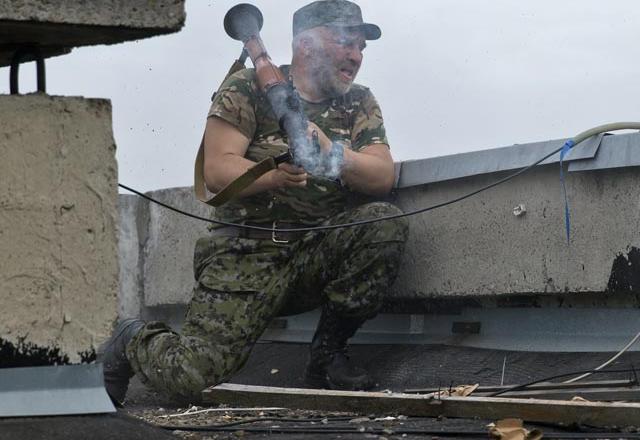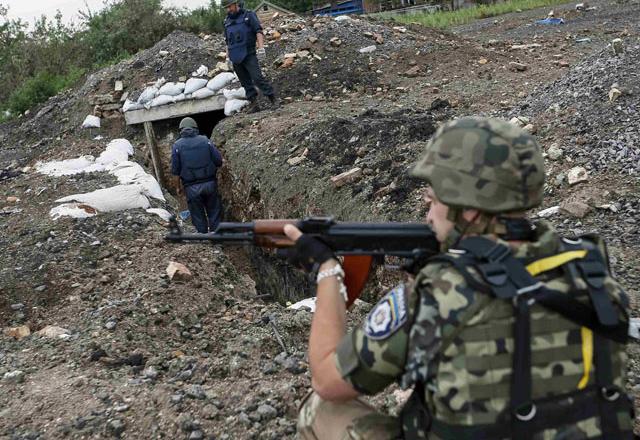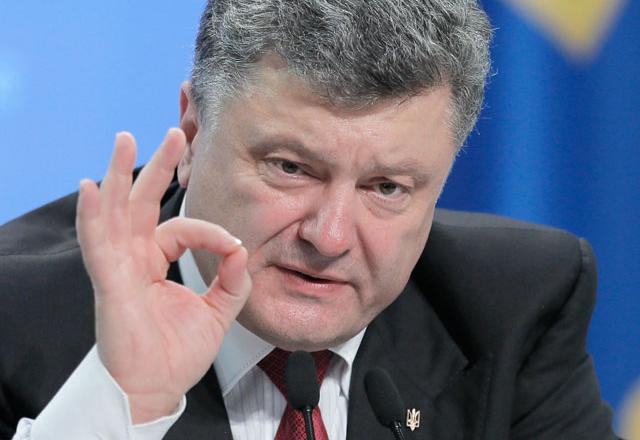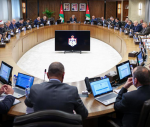You are here
Russia grants gas respite but talks tough on Ukraine
By Reuters - Jun 02,2014 - Last updated at Jun 02,2014

DONETSK, Ukraine/MOSCOW — Russia gave Ukraine a breathing space on Monday in a multi-billion-dollar gas dispute but balanced the concession with fierce denunciations of Kiev and NATO, while fighting raged all day in eastern Ukraine.
Russia accused NATO of whipping up dangerous tensions near its borders and encouraging Ukraine to use force against pro-Russian separatists. At a tense meeting in Brussels, the alliance urged Moscow to stop arming the rebels.
In the eastern city of Luhansk, Ukrainian border guards said a pro-Russian militia had attacked one of their posts with automatic weapons and grenade launchers in the early hours, triggering a prolonged battle about which both sides gave conflicting information.
Ukraine and its Western allies accuse Moscow of fuelling the pro-Russian uprising that threatens to break up the former Soviet republic of 45 million people. Russia denies orchestrating the unrest, and says Ukraine’s attempts to end it by military force are making the situation worse.
In a conciliatory signal, Russia’s Gazprom gave Ukraine until June 9 to resolve the two countries’ long-running row over gas pricing, postponing a threat to cut off supplies as early as Tuesday.
But two top Russian officials turned up the volume of Cold War-style rhetoric in the worst East-West crisis since the fall of Communism a quarter of a century ago.
Foreign Minister Sergei Lavrov said Moscow would submit a draft resolution to the United Nations Security Council later on Monday, calling for an immediate end to the violence in eastern Ukraine and the creation of humanitarian corridors to help civilians escape the fighting.
In pointed comments aimed at newly elected Ukrainian President Petro Poroshenko, Lavrov said that Western nations had assured Russia the situation in Ukraine would improve after the May 25 election that brought him to power. Instead of that, he said, “everything is happening in exactly the opposite way”.
“People are dying every day. Peaceful civilians are suffering more and more — the army, military aviation and heavy weapons continue to be used against them,” Lavrov told reporters in Moscow.
‘Unprecedented activity’
In Brussels, Russia’s envoy to NATO accused the Western alliance of exacerbating the crisis.
“We have noticed unprecedented NATO activity near Russia’s borders. It is excessive, inappropriate and weakens stability, security and predictability in the Euro-Atlantic region,” state-run RIA news agency quoted Alexander Grushko as saying.
A NATO spokeswoman said alliance members called on Russia “to stop the flow of arms and weapons across the border, to stop supporting armed separatists in Ukraine, and to withdraw in a full and verifiable manner their troops from the Ukrainian border”.
Russia denies arming the rebels or orchestrating the unrest, although increasing numbers of Russian fighters have been seen on the separatist side.
President-elect Poroshenko and Ukraine’s pro-Western government have defied Moscow’s repeated calls for an end to what Kiev calls its “anti-terrorist” operation against armed separatists in the eastern Donetsk and Luhansk regions, who want to follow the example of Crimea by splitting from Ukraine and joining Russia.
New deadline
Poroshenko is due to be inaugurated on Saturday and will immediately face an array of crises, including the new deadline in the gas dispute.
Since the overthrow of pro-Russian Ukrainian President Viktor Yanukovich in February, Russia has demanded a sharp increase in the price Ukraine pays for gas. Kiev says it cannot afford it and wants the discounted price it negotiated in the past.
While the dispute has dragged on, Gazprom has continued billing Kiev at the higher rate. It says Ukraine already owes it more than $5 billion in unpaid bills and is running up more debt at a rate of more than $1 billion per month.
But after Kiev paid off $786 million of its gas debt, Gazprom announced a six-day extension of the deadline until June 9. Gazprom also said that it would not sue Ukraine’s gas supplier Naftogaz over unpaid bills during the coming week.
The dispute has wider energy implications for Europe, which gets a third of its gas needs from Russia and almost half of these supplies via Ukraine.
Rising violence
Despite a pullback of some of the tens of thousands of Russian troops on the border with Ukraine, violence increased in the east of the country at the start of last week, with dozens of pro-Moscow rebel fighters killed in a government assault. Many were Russians, whose bodies were sent back across the border.
In Monday’s fighting, Ukrainian security sources said a force of separatists had occupied the upper floors of an apartment block and were shooting into the border post on the southern edge of Luhansk, a city very close to the frontier with Russia.
A separatist fighter, Alexander Gureyev, said by telephone that a Ukrainian fighter plane had shot at the regional administration building. “There are dead and injured in the city,” he said.
Interfax-Ukraine news agency quoted a senior local health official as saying that an explosion in the building had killed two people. Ukrainian authorities denied they had conducted an air strike.
Earlier, a border guard spokesman, Oleh Slobodin, said: “We have eight or nine wounded. The attackers have five dead and eight wounded.”
In Geneva, a spokesman for the UN Office for the Coordination of Humanitarian Affairs declined to comment on Russia’s proposal to create humanitarian corridors for civilians to get out of harm’s way.
“Generally, when we talk about corridors, it always needs to be clear, first of all from where to where? And particularly, who is going to secure that corridor?” spokesman Jens Laerke said.
“Because once you say here’s a corridor, once people start moving on that, if there’s no one to protect them, then it’s very dangerous.”
Related Articles
Pro-Moscow protesters in eastern Ukraine seized arms in one city and declared a separatist republic in another, in moves Kiev described on Monday as part of a Russian-orchestrated plan to justify an invasion to dismember the country.
Ukraine on Monday accused Russian army officers of fighting alongside separatists in the east of the country and said Moscow was once more building up its troops on the joint border.
President Petro Poroshenko on Thursday proclaimed an end to the "most dangerous" part of Ukraine's pro-Russian uprising and the start of a post-war recovery that would lead to an EU membership bid in 2020.



















